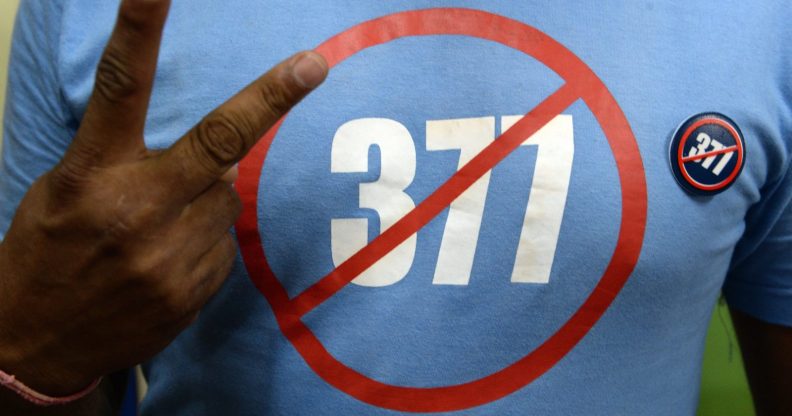Bombay Times sent home LGBT interviewees because they ‘didn’t look gay enough’

(Getty)
A 19-year-old woman has claimed that she walked out of a photoshoot for a national newspaper in India after its LGBT participants were told that they “didn’t look gay enough”.
Suknidh Kaur, who was interviewed by the Bombay Times, was asked to participate in a photoshoot for the publication alongside six LGBT interviewees.
The participants, who were being interviewed about Section 377 – a colonial-era law that penalises sex between men – were minutes into the shoot when they were instructed to “go home and come back tomorrow,” as “the queer people present were not dressed appropriately,” alleged the activist.
Sharing her experiences on Twitter, Kaur said that the group decided to walk out after they received the offensive marks from the photographers representing the publication, writing that they were asked to “come back dressed as their stereotypes, the ones they are ridiculed for time and time again.”
https://twitter.com/skhndh/status/956225896863580160
https://twitter.com/skhndh/status/956226379380641794
The activist also said that the publication instructed a cross-dressing man to come back to the shoot tomorrow “in his costume”, as well as asking the queer women involved to come back “looking more androgynous”.
https://twitter.com/skhndh/status/956226988963856384
https://twitter.com/skhndh/status/956227584177577985
https://twitter.com/skhndh/status/956228011845607424
Suknidh declined to name the people responsible in the hope that they would “learn” from the experience.
In spite of the outcry, Bombay Times has apparently not reached out to apologise to any of the participants.
However, several Twitter users have spoken out in support and frustration about the treatment of the interviewees.
https://twitter.com/skhndh/status/956389832929902592
“The journalist’s behaviour towards the community yesterday was rooted in ignorance, not spite – twitter will bash the person up ruthlessly for a mistake,” they said.
“Educating them and having them learn from the experience makes more sense than an outright boycott to me.”
Curating appearances for the sake of preconception is the literal opposite of good journalism. We're not here to exhibit "flair" for or throw a parade 24/7.
— കഷ്ടം! (@quasarboi) January 25, 2018
The problem is the fact that people still expect ?️?members to be “different” from their str8 counterparts using dated cliches & stereotypes. Then again, a ? is obviously superior to a dark grey ☁️ of heteronormativity. Guess str8 peeps can’t handle n start h8ing— Zorian Cross (@ZorianCross) January 25, 2018
Although the conversation around India’s LGBT community is diversifying, Indians, like several other post-colonial countries, face myriad difficulties perpetuated by the homophobia of colonialism.
While Section 377 is currently under review, after a law to decriminalise homosexuality was overridden in 2013.
The Delhi High Court ruling, IPC 377, was overruled by the Supreme Court of India.
Sexual intercourse between two people of the same sex is currently illegal, being punishable by up to 10 years imprisonment.

